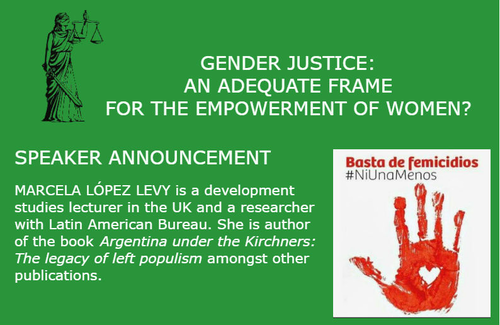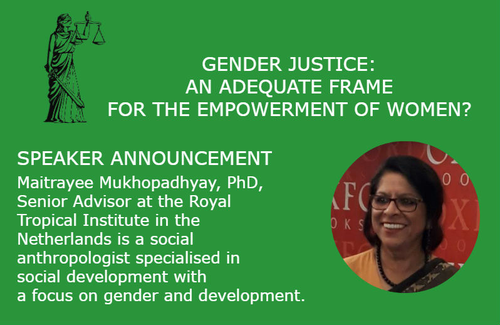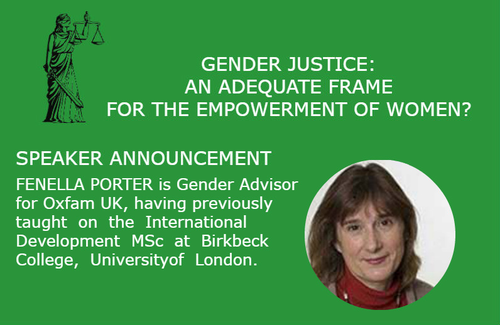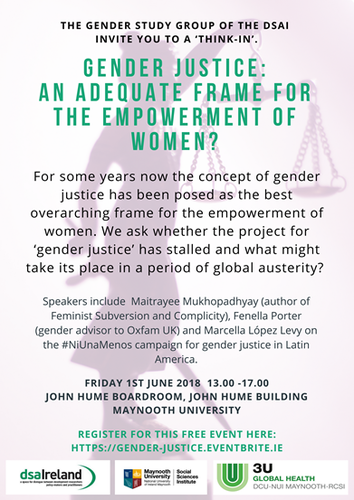Register for this free event here: https://gender-justice.eventbrite.ie
For some years now the concept of gender justice has been posed as the best overarching frame for the understanding of women and development, and in pursuit of the empowerment of women.The history of gender mainstreaming is now being reassessed and its limitations realised. For many it is a problem related to depolitisation whereby a technical fix is substituted for a genuine movement for social transformation.
There is a sense that the project for ‘gender justice’ has stalled due to the loss of credibility of the mainstreaming agenda, the failure of the human rights frame to take its place in a period of austerity, and an assault on the living standards of working women. A particular problem has been that of finding common ground between the gender equity policies, projects and programmes and the ongoing struggle to assert women’s right and combat inequality and oppression.
It is in this context of honest reflection and re-energising that we pose the need to interrogate the concept of gender justice from a contextual, conceptual and power-knowledge perspective.
We have invited a wide range of national and international researchers, practitioners and policy makers to make a concerted effort, in a collegial atmosphere, to push the debate forward while informing each other from our very different subject positions.
We welcome active participants to this 'think-in' to share in this effort. Attendance is free but places are limited so please RSVP.
Speakers

Marcela Lopez Levy is a development studies lecturer in the UK and a researcher with Latin American Bureau. She is author of a book on Argentina under the Kirchners: The legacy of left populism amongst other publications.
Dr Levy will be speaking on the #NiUnaMenos campaign against gender based violence that began in Argentina.
Ni Una Menos is "Not one [woman] less" an Argentine fourth-wave grassroots feminist movement, which has spread across several Latin American countries, that campaigns against gender-based violence. In its official website, Ni una menos defines itself as a "collective cry against machista violence." The movement regularly holds protests against femicides, but has also touched on topics such as gender roles, sexual harassment, gender pay gap, sexual objectification, legality of abortion, sex workers' rights and transgender rights.

Maitrayee Mukhopadhyay, PhD, Senior Advisor at the Royal Tropical Institute in the Netherlands is a social anthropologist specialised in social development with a focus on gender and development. She has 30 years of experience in gender and development research, advisory work, teaching and training.
Her most recent book is Feminist Subversion and Complicity - Governmentalities and Gender Knowledge in South Asia
Her argument around gender mainstreaming is that:
Gender mainstreaming in the 1990s became the principle strategy by which governments and development organisations set out to take the gender agenda. Despite great optimism, 20 years later it is difficult to find any review of gender mainstreaming which has more than a few positive aspects to report among a litany of failures. Gender mainstreaming has taken many forms, and has been rolled out in a variety of organisations from multilaterals, to governments, to small and large non-governmental organisations (NGOs). Yet critiques and reviews are almost universally negative, and several commentators question the viability of gender mainstreaming, seeing it as an irredeemably failed strategy. Future feminist engagements with development institutions cannot be about ‘doing more of the same better’ but rather these strategies need to radically change.

Fenella Porter is Gender Advisor for Oxfam UK, having previously taught on the International Development MSc at Birkbeck College, University of London.
She is the author of the chapter on gender and NGOs in the Handbook of Development and Social Change.
Fenella Porter is the author of the chapter on gender and NGOs in the Handbook of Development and Social Change where she argues that:
“The interests of women are represented by being inserted into the development system often via international NGOs operating successfully at the highest levels of policy making. This has had a specific impact on the meaning of gender equality, in which the interests of women are aligned with instrumentalised ideas of economic and political participation reduced to buzzwords that garland policy discourses, rather than with more politicised ideas of empowerment and women’s rights”.
Programme
12.30 - 13.00: Welcome and Light Lunch
hosted by Director of MUSSI, Linda Connolly
13.00 - 14.45: Round Table 1: Gender Justice and Development Futures (Facilitator: G. Honor Fagan)
13.10 - 13.40: Maitrayee Mukhopadhyay- Including gender or governing gender: gender and development futures
13.40 - 13.55: Claire McGing- Remedying a 'democratic deficit'? Electoral gender quotas after Beijing
13.55 – 14.15: Marcela López- NiUnaMenos in Argentina: the blossoming of a new political movement with deep roots in feminist organising and communication
14.45 - 15.00: Coffee Break
15.00 - 16.45: Round Table 2: Gender Justice and Development Interventions (Facilitator: Angela Veale)
15.05 - 15.25: Fenella Porter- The discursive landscape of non-governmental action in development: the inevitable failure of international NGO’s to represent the interests of women?
15.25 - 15.40: Carol Ballantine- The personal is still the political: evidence of partner violence during conflict in South Sudan
15.40 - 15.55: Vanessa Liston- Measurement, data and gender injustice - current approaches and the value of social perspectives
15.55 - 16.10: Tanja Kleibl- Do Western approaches to development de-legitimize women's resistance through "empowerment"?
16.45: Book Launch and Reception in MUSSI

